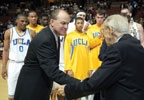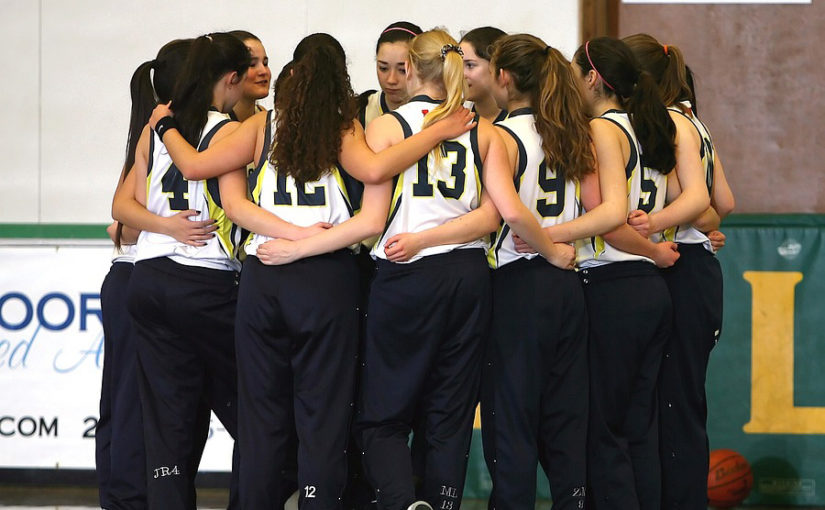Something’s Bruin
Ben Howland is bent on restoring UCLA’s championship legacy
COACH: You were born in Lebanon, OR, in 1957 and grew up in Southern California. What was your childhood like? How did you pass the time as a youth?
HOWLAND: I had a great childhood. I spent a lot of my youth in Santa Barbara and Goleta, CA. I grew up playing basketball at the Goleta Boys Club, which is where I fell in love with the game of basketball. During that same time, I was watching the UCLA games that were replayed at night on television. That was the era of the great John Wooden teams. I remember watching them when I was seven or eight years old. I spent the last two and a half years of high school in Cerritos, CA, and that was a good experience as well. I met a lot of nice people. |
| Coach Howland |
COACH: You began your prep career at Dos Pueblos High School in Goleta, CA, before garnering two Suburban League MVP honors at Cerritos (CA) High in the 1970’s. You also were a two-time All-California Interscholastic Federation selection. What position did you play and what kind of player were you?
HOWLAND: I played for a very good high school coach in Ian Desborough at Cerritos High School. I really appreciated what an outstanding coach and person he was. I played both point guard and off-guard. I was the type of player that played real hard and was very competitive. I tried to play with a lot of passion and heart.
COACH: After playing two seasons at Santa Barbara (CA) Community College – where you were named team captain and led the Vaqueros to the California finals in 1978 – you transferred to Weber State, where, as a two-time defensive MVP, you helped guide the Wildcats to successive Big Sky Championships and NCAA Tournament Appearances.
HOWLAND: I really enjoyed my experience at Santa Barbara CC because all of my teammates, for the most part, were guys that I grew up with. Tom DeMarcus, Greg Henderson, Arnie Beck, Dan Pagliotti and I have all grown up together since the age of 10. We also had a good local player in Eddie White and went 31-4 in my sophomore season while playing for an outstanding coach in Ed DeLacy. I then went on to play for another great coach in Neil McCarthy at Weber State. My best friends still to this day are my former teammates from high school and college. I’ve known my friend Ken Scott since I was 16 and I’m 50 years old now. My college teammates David Johnson and Mark Mattos are my best friends to this day. The highlight of my time in college was going to the NCAA Tournament after winning the Big Sky Championships in 1978 and 1979. I had great coaches and still respect them and I have a great appreciation for what I learned from them as a player.
COACH: Your first paid coaching job was an assistant to Jerry Pimm at UC-Santa Barbara, where you served loyally from 1982-1994. During that time you helped lead the Gauchos to five postseason appearances. What did you learn about the game and yourself as you developed your coaching acumen?
HOWLAND: Jerry was an outstanding teacher and really had a great feel for the game and the business. He taught me a lot both on the floor and in terms of how you market a program and sell a program as it pertains to recruiting. I owe Jerry a lot for the success I have had in this business. I truly am indebted to him. He still stays involved and we talk after some of our games. He still gives me some pointers and some insight to what he observed, so he’s still very involved. The bottom line is that when you are an assistant coach at the college level, the one thing that is very clear is that if you don’t win, you are going to be out of a job. So the work ethic and the time that it takes to get the job done is paramount. I also learned that I really love the relationships with the players and I have developed a lot of good friendships that have lasted throughout my life.
COACH: In 1981 you landed your first Division I coaching job, as a graduate assistant at Gonzaga under your childhood friend, Jay Hillock. While in Spokane you tutored future NBA Hall of Famer John Stockton, usually guarding him in practice. What was that initial experience like? Did you ever think that Gonzaga would achieve the elite status it has?
HOWLAND: I have known Jay Hillock since I was a youngster and he gave me my first break. He was actually an assistant coach at Santa Barbara CC when we first met. I’ve known him since I was 10 years old and we are still close friends to this day. It is really different than today’s Gonzaga in that the resources we had to recruit weren’t there. I’m really happy that Gonzaga has turned in to such an outstanding basketball program. Not only Jay, but Dan Fitzgerald, the long-time coach and athletic director, deserves a lot of credit for that.
COACH: You have a knack for building successful programs from basically nothing. That was evident by posting 20-win seasons in your third year at both Northern Arizona and Pittsburgh, where you posted a 29-win campaign. Obviously having good players is an important foundation for doing so. But what does a coach have to do in order for them to believe and buy into what you are doing? What have you done specifically?
HOWLAND: It all starts and ends with really good players and outstanding coaching staffs. I have been fortunate enough to be able to recruit and to assemble great staffs. You are only as good as the people around you and I have been very fortunate to work with a number of outstanding coaches that have gone on to head coaching jobs. I’m really happy for them. Jamie Dixon, Mike Adras, Ernie Zeigler, Bernie Rohrssen, Kerry Keating, and Chris Carlson have all been my assistants that have moved one to become head coaches. Even now, I have outstanding coaches in Scott Duncan, Donny Daniels, and Scott Garson. In terms of players buying into the system, all players want to win. Recruiting talented young men with high character is something that I have always placed a high priority on. Not only is it important to recruit good athletes but also good people because when adversity hits, you want them to be able to learn from it and don’t succumb to it. So I’ve been very fortunate to have good players everywhere I’ve been.
COACH: How influential and helpful has John Wooden been during your time in Westwood? We would think his vast knowledge of not only basketball but the expectations at UCLA would be immeasurable.
HOWLAND: Coach Wooden has been a great friend to me and I’ve always looked up to him. He is the greatest coach in the history of sports, not just basketball but in any sport. The thing I love most about Coach Wooden is having said that he’s the greatest coach ever; he’s an even better human being. My relationship with Coach Wooden is special to me and I still pinch myself to think that I am a part of the UCLA program and part of the history of the greatest college basketball program of all-time.
COACH: Former Bruins coach Steve Lavin said that of all the coaches who have succeeded Coach Wooden – and that’s a pretty long list that includes the likes of Gene Bartow, Larry Brown, Larry Farmer, Jim Harrick, and Lavin – you were the best equipped. What is it about your personality and make-up that has allowed you to step out of Wooden’s long shadow and not give in to the pressure of being at the most storied collegiate basketball program?
HOWLAND: That’s really nice of Steve Lavin to say that and I really appreciate that, but all of those aforementioned coaches were outstanding and did a great job, including Steve. The expectation level here at UCLA is second-to-none. I have never been afraid of the expectations or to be a part of such a special place with such a great history. I think it is something that motivates you either as a player or a coach. I like it because our players expect to win. When they wear that UCLA jersey and understand the tradition and history, they understand the expectations, and the expectation is to win. To win doing things the right way while handling yourself on and off the floor in a positive manner and to have respect for your families and the University.
COACH: We understand that you had a desire to coach since you were a teenager. From where did that yearning come? Who were your inspirations?
HOWLAND: I knew I wanted to take basketball as far as I could get. My boyhood idol in the pros was Jerry West, like any loyal Laker fan. Jerry was the greatest professional player in my mind during my childhood years. Growing up watching all the UCLA teams and seeing them never lose, it seemed like, and it was really a special time. Listening to Dick Enberg call the games and be so enthusiastic was a special time in my life that I will never forget. I always knew I wanted to be involved in coaching basketball once the playing days were over. Not many people get to do their dream job and go to work everyday loving what they do and I can truly say that I feel that way. I love my job and feel very fortunate to being doing what I love to do.
COACH: Two of your more successful coaching attributes are a penchant for hard-nosed, throwback defense and an unsurpassed work ethic. How did you develop those traits?
HOWLAND: Defense wins championships at all levels of every sport. In order to be successful, you need to have a consistent defense no matter what sport you are talking about. I think you have to have a strong work ethic to be as successful as you can be. In any sport, you have to try and work as hard as you possibly can and if you don’t, you won’t last long either as a player or as a coach. I’ve been fortunate to be around great coaches and players and learned a lot from those people.
COACH: What is they key to getting your players to make a commitment at both ends of the floor?
HOWLAND: As Coach John Wooden would say, the number one motivator for a player is sitting on the bench. Every player wants to play and if they know that they have to execute and play hard at both ends of the floor in order to play, than they will be willing to sacrifice and do those things. When you have success and it becomes evident that those things work, then it gets even easier.
COACH: You played professionally in Uruguay. That said, what is the perception of U.S. Basketball abroad?
HOWLAND: When I played in Uruguay, it was over 30 years ago and things have changed quite a bit. There’s no question that around the world, USA Basketball has been perceived to be the best in the world. But with so much success of the foreign players in the NBA and the outstanding play of other countries in the recent Olympic Games beating some of our teams, it really points to the fact that basketball has become an international game and the whole world is in love with the game.
COACH: You are widely considered to be one of the great motivators and teachers in college athletics. Can you motivate today’s student-athletes both internally and externally? How do you reach someone that may be less inclined to accept your motivational tactics?
HOWLAND: Not everyone is the same and people are motivated differently. Recruiting players that have leadership qualities is important because players are great at motivating each other and pushing one another. One of the great motivational tactics that I use is just purely through competition. Creating a competitive environment every day in practice and pushing your players to be their best so that you are in fact creating an environment that is game-like. You need to have everyone striving to play at the level of the game’s intensity.
COACH: What is your defensive philosophy? What kind of defense do the Bruins employ?
HOWLAND: We play just about 100 percent man-to-man defense. We try to do a good job of transition defense and not allow our opponents to score a lot of easy baskets in transition, whether they are layups or three-pointers. We try to be aggressive with our ball pressure and be help-conscious as a team playing solid team defense. Each year you have to adjust your defense based on your personnel and level of quickness. Quickness, along with size and strength, are the most important things to being a good player.
COACH: Do you have a favorite practice drill that you have been using throughout your years as a head coach? If so, can you share it with us?
HOWLAND: Building your defense through the shell drill and being able to add a lot of different things are important. Shell is basically four-on-four with a two-guard front and two wings. But you can set it up any way you want with a post, two wings and a point. I think most coaches do a lot of teaching out of the shell drill and I’m no exception to that.
COACH: As a coach, do you subscribe to the theory of having your players adapt to the system or adapting the system to the players?
HOWLAND: Every coach has a system, but you have to be able to adapt to your personnel. Whether you have a team that has a great ability to shoot or great athletes or lack of athleticism, I think it is a combination of both. You might have to tinker with your system and they will have to adapt as well.
COACH: Who are your coaching mentors and who has had the biggest influence on you in the coaching profession?
HOWLAND: Obviously the coaches that I have played for have been influential (Coach Desborough, Coach DeLacy, Coach McCarthy and Coach Hillock) and then later Coach Pimm. But once I became a head coach, there’s no question that Coach Rick Majerus had the biggest influence on me as a coach. I really learned a lot from Rick and I think he is a brilliant basketball coach and is one of the best in the country. He allowed me to learn from him and was very helpful in allowing me to stay in this coaching profession as a head coach.
COACH: Having solid communication skills is paramount as a coach. That being said, what is the key to being a not only a good teacher for your players, but also a good listener?
HOWLAND: I think the main important thing in communication is to be honest. I have always tried to be very straightforward and very honest with my players. You also need to be a good listener and respect the feelings of your players to understand what is going on with them in terms of how they are looking at things, especially with your point guard because he’s your quarterback on the floor. He should have the pulse of your team and you need to make sure that you are in constant communication with him during a game.
COACH: What aspect of coaching do you enjoy the most and why: recruiting, practice, game preparation, or in-game decision making?
HOWLAND: Practice is by far the most fun. But I really enjoy game preparation, watching film to prepare for the games against all of the great teams that we play.
COACH: Anyone that has seen one of your press conferences knows that you possess a quick wit and a wonderful sense of humor, especially in jousting with the media. How and when do you reveal that side to your players and how important is that trait in being a successful coach?
HOWLAND: I have always enjoyed the relationship with the players and I think for sure one of the greatest joys of coaching is the long-lasting relationships formed with your players that last a lifetime and never end. I have always enjoyed that aspect of coaching and continue to do so. I love seeing players grow and mature beyond their years as players and have families and still stay in contact with them. That really is a great joy and probably one of the most important aspects of why I enjoy coaching so much.
COACH: With all of the success you have enjoyed, highlighted by back-to-back Final Four appearances and the 2006 NCAA Championship game, you have been quoted as saying, “It’s nice to be recognized, but you can never rest on what you’ve done. You have to keep working, keep pushing to get better. You’ve got to have good players. No one understands that more than me. I hope to think every year I’m a better coach than I was the year before. You hope to always improve.” What motivates you each and every season? More importantly, what goals do you hope to achieve other than wins and titles?
HOWLAND: I already alluded to the fact that I am very much motivated by the great tradition and history at UCLA. I want our fans and especially Coach Wooden and the former players to feel good about the program. I want my players to play hard and to play unselfishly with great determination and passion for the game. My fellow coaches and I all compete very hard and are trying to win, but at the end of the day, we are in a special fraternity of coaching, one that I really respect and feel blessed to be in.
About the Author
Kevin Newell is the former editor of Coach and Athletic Director magazine.












